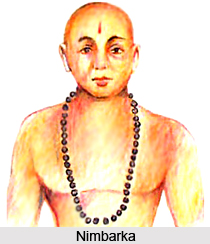 The teachings of Nimbarka preach the six forms of surrender practice the nine limbs of Bhakti as well as believe in the dasa mula or the ten cardinal points of Gaudiya philosophy. The followers of Nimbarka also worship Radha and Krishna in Vrindavan.
Nimbarkacharya came up with the theory of Dvaitya Advaitya that laid the foundation of Nimbarka Sampradaya. Dvaitya refers to duality and Advaitya means unified. All animate and inanimate objects are part of God and all souls are part of Supreme Soul.
The teachings of Nimbarka preach the six forms of surrender practice the nine limbs of Bhakti as well as believe in the dasa mula or the ten cardinal points of Gaudiya philosophy. The followers of Nimbarka also worship Radha and Krishna in Vrindavan.
Nimbarkacharya came up with the theory of Dvaitya Advaitya that laid the foundation of Nimbarka Sampradaya. Dvaitya refers to duality and Advaitya means unified. All animate and inanimate objects are part of God and all souls are part of Supreme Soul.
The essence of Nimbarka philosophy helps to realize the importance of universal goodwill, world peace and humanity. According to Nimbarka Philosophy, Jiva is a part of God. The relation of difference in identity exists between the individual soul and God. They are identical. Nimbarka also maintains that Jiva is pure knowledge. Jiva has limited power. Jiva is considered as a power of God and Supreme self. The universe is part of God.
Liberation is the exalted human attainment through which the soul attains its highest enlightenment. It is a spiritual union between individual soul and the supreme soul. Nimbarka maintains that the ignorance belongs to the individual soul. Even in liberation the individual soul remains subordinate to God. The liberated soul acquires divine powers but he does not become almighty. He is not endowed with the power of creation, preservation and destruction which are prerogatives of God.
 According to Nimbarka there are two types of reality: Independent and Dependent reality. God is considered as the only independent entity. Again there are two types of dependent realities: conscious and non-conscious. Jiva is the only conscious entity. There are three non-conscious entities- Aprakrta, Kala or Time and Prakrti or Primordial Nature. There seems to be no clear distinction between the Svarupa and Svabhaava of Isvara. In general Nimbarka`s system recognises Isvara as the substrate of all positive attributes. The eternal form of God is Radha Krishna. While all pervading Lord is present in this eternal divine abode
According to Nimbarka there are two types of reality: Independent and Dependent reality. God is considered as the only independent entity. Again there are two types of dependent realities: conscious and non-conscious. Jiva is the only conscious entity. There are three non-conscious entities- Aprakrta, Kala or Time and Prakrti or Primordial Nature. There seems to be no clear distinction between the Svarupa and Svabhaava of Isvara. In general Nimbarka`s system recognises Isvara as the substrate of all positive attributes. The eternal form of God is Radha Krishna. While all pervading Lord is present in this eternal divine abode
Brahman has several other forms in his creative manifestation. These are the Vyuhas and the Avataras. There are four Vyuhas-Vasudeva, Sankarsana, Pradyumna, and Aniruddha. For the protection of Dharma and blessing of devotees, he manifests Himself as Incarnations. There are three types of incarnations: Gunayataras are his manifestations assuming Gunas of Prakrti-Sattva, Rajas and Tamas-for creation, preservation and dissolution of the manifested universe. Purusayatara is the manifestation for controlling the evolution of Prakriti. 3) Lilavataras has several other variations.
According
to Nimbarka, God is essentially with a form and the substrate of all auspicious attributes. When the Upanishads speak of him as `Nirguna`, it means only that he is not subject to the Gunas. Nirvisesa means he is without attributes. His form and auspicious attributes do not impair his all-pervasiveness.




















